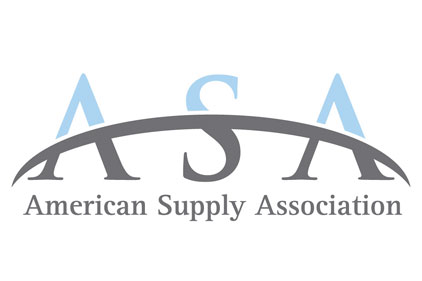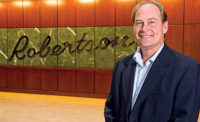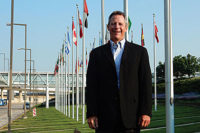
Incoming 2013 ASA
President Jeff Pope at Fenway Park in Boston. Photos courtesy of F.W. Webb.
F.W. WebbPresidentJeff Popehad an inkling he would one day be working in the family business.
So he majored in English at Dartmouth University.
“Dartmouth didn’t have a business major,” says Pope, who will take the reins asASA’s 44th president on Jan. 1, 2013. “I took a few economics courses, but I didn’t want to be an economics major. I knew I had to write and communicate. English seemed to make the most sense.”
However, Pope’s indoctrination into the family business occurred well before he stepped foot on Dartmouth’s Hanover, N.H., campus - something he’s thankful for.
“During summers in high school I would work in F.W. Webb warehouses and pipe shops stocking shelves,” he says. “I would recommend starting from the ground up to anyone. It means you are able to walk in everybody’s shoes. You know how they feel and you see that what they do, no matter what it is, it’s invaluable. The things I learned during that time, I’ll never lose. When people talk to you about their jobs, you know exactly what they are talking about. When you’ve done their jobs, you can speak their language and you earn their respect because you’ve paid your dues.”
Pope’s interest in F.W. Webb continued to grow throughout his childhood. He saw how passionate his parents and grandparents were when they talked about the family business away from the shop.
“My mother and father [F.W. Webb Owner John Pope] would talk about work issues most every night at dinnertime and my dad would go see my grandparents and do the same thing,” he says. [Pope’s grandfather, Roger, purchased the company in 1933.]
“I saw that the business took very good care of our family and our employees’ families. My dad really enjoyed what he was doing and he still loves it to this day. It’s an industry that is very solid and consistent. Distribution is a function that is not going away. Somebody will always have to move products from Point A to Point B.”
These days, Pope is president of a PHCP wholesaling giant with annual revenues approaching $800 million. F.W. Webb ranked 10th on the2012 Supply House Times Premier 125list published in our May 2012 issue. The Premier 125 ranks the top PHCP wholesalers by their sales from the past year.
“We work hard to do what we do well,” he says. “We try to make sure we are the best at moving products to a customer, to a house, a factory, a college or a hospital. This business is dynamic. It never stops changing.”

Pope
is president of a PHCP wholesaling giant that has annual revenues approaching
$800 million.
Pope notes that during the economic downturn F.W. Webb held firm on inventory and had minimal staff reductions. “The services were still there, the people were still there and the morale was up,” he says. “We still had value to offer customers through our products and our expertise and we didn’t have to freeze salaries.”
Given the uncertain times, Pope admits such a strategy was a big risk to take. “Some of our competitors chose different tracks,” he says. “It was a calculated risk. There may have been times when I wondered whether we had taken the right course. But in the long run, it made the most sense.
“We’re not a small company, but it doesn’t matter what size you are in a situation like that. People make you or break you and we have great people. We challenge our management and sales teams in every location to grow every year and never be satisfied with what they’ve already achieved. If they had a decent sales year or decent profits, that’s good but we always ask ourselves what are we going to do next year or the year after? There are always opportunities to grow and get better at the fundamentals and at doing the best job we can. We are likeSeabiscuitwith the blinders on. We keep running hard to make sure we’re the easiest company to do business with and that we are one of the top choices of customers in our markets.”
When he’s not tending to F.W. Webb business, the 55-year-old Pope enjoys golfing (“I play golf, but not very well,” he laughs), boating and spending time with his family. Pope and his wife of 29 years,Carmen, are the proud parents ofKellyandDave. Kelly Pope recently graduated from Bowdoin College in Brunswick, Maine and is now working in Nicaragua with the Soccer Without Borders nonprofit organization. Dave Pope is a freshman placekicker on the Union College (Schenectady, N.Y.) football team.
Pope took some time recently to chat with Supply House Times about a variety of topics pertinent to ASA’s membership and the wholesaling industry in general. Here are some key highlights from this exclusive interview.
Supply House Times: What will be your main areas of focus during your year as ASA's president?
JSP:We have four key areas as an association that we have decided to really focus on: benchmarking, networking, advocacy and education. Growing ASA’s membership means we have to keep improving in those four areas. For example, we’ll keep improving our efforts to educate and recruit young men and women from colleges and vocational schools and to establish internship programs.Supply House Times: ASA now has Dan Hilton working full-time in Washington as the association's governmental affairs director. How important is that political component to the membership?
JSP:Having Dan in Washington is extremely valuable, especially with issues such as LIFO and the Affordable Care Act. Those are two major areas that can significantly impact members of our association both on the supplier and vendor sides.
F.W.
Webb employee Chuck Savage is a warehouse receiver at the company’s central
distribution center in Amherst, N.H.
Supply House Times: ASA has achieved net membership growth for the first time in anyone's memory. With a new round of consolidation going on, how do you see this impacting ASA and your plans for the future growth of the association?
JSP:ASA’s team is terrific. [ASA Executive Vice President]Mike Adelizzihas done a great job not just maintaining membership, but growing it. Mike’s passion is to grow this organization through members, whether wholesalers or vendors. His success proves that it is very effective to have someone dedicated to that specific goal. Especially in these times when consolidation is so prevalent, we need someone who is listening to wholesalers and finding out what services ASA can provide to make them want to participate. ASA is growing much stronger and my goal, like the presidents before me, is to make it even better than it is today.Supply House Times: ASA has started to engage industry customers through new publications such as PVF Outlook. What do you hope to accomplish by talking to our industry's customers?
JSP:We want to help our members be more valuable to their customers and we can do that by listening to their concerns. F.W. Webb is constantly looking for ways to be more valuable to our customers. We consider our employees internal customers and our customers external customers. In my opinion, knowing what both your internal and external customers want is the key to success. You have to listen and ask and learn. That is how you continue to be of value.Supply House Times: During your time on the ASA Executive Committee what was the most valuable lesson you learned from your peers?
JSP:To try to leave the organization better than you found it. To its credit, ASA has never been afraid to confront difficult issues. There was a time when the group was not healthy and did not have a clear story to tell as to why folks should join. Some tough financial decisions had to be made, but they were the right things to do. Sometimes you have to take a step backward to go two or three steps forward. ASA is taking the steps forward now.Supply House Times: What is your plan to ensure ASA regional affiliates continue their success?
JSP:We must keep giving them compelling reasons to go to local conventions and utilize the educational products ASA offers and the benchmarking opportunities available. A great example is the ASA Legislative Fly-In this past May in Washington. I would urge the regional groups to take advantage of things like that. The more people put into it, the more they will get out of it.Supply House Times: Why do you think the vendor relationship with ASA is improving?
JSP:They see we have a solid offering and that we are working hard to grow our membership and maintain the current membership. Even with consolidation, we’re keeping the net membership up and looking for other ways to grow. We’re reaching out to our vendors in a better way. We have to continue doing that and getting their input. Vendors are our customers too. We need to keep talking and listening to them. At F.W. Webb, we’ve done some things along those lines that we believe are unique. When the Ryder Cup [golf tournament] was here in Boston in 1999 we had a day just for vendors and we made sure it was their day. They are valuable partners to us.JSP: They see we have a solid offering and that we are working hard to grow our membership and maintain the current membership. Even with consolidation, we're keeping the net membership up and looking for other ways to grow. We're reaching out to our vendors in a better way. We have to continue doing that and getting their input. Vendors are our customers too. We need to keep talking and listening to them. At F.W. Webb, we've done some things along those lines that we believe are unique. When the Ryder Cup [golf tournament] was here in Boston in 1999 we had a day just for vendors and we made sure it was their day. They are valuable partners to us.
JSP:Joining ASA can help make your company more profitable. You will have access to ASA’s education programs and to industry information through benchmarking. Ideas from networking pop up everywhere. The convention [NetworkASA 2012] is a great way to network with peers and vendors. We’re always keeping our eyes and ears open to see how we can continue to improve what ASA has to offer. During my parents’ time in the 1960s and 1970s, ASA was a big organization. There is no reason why we can’t get it back to the kind of size and scope it once had, even with consolidation. My goal is to see this association be the go-to place for everybody - vendors, contractors and wholesalers.
From
left: F.W. Webb’s Woburn, Mass., counter sales team of Ken Tufts, Stephen
Jones, Steve Recco and Paul Sferrazza.
Supply House Times: What is your take on the role the Internet is playing in our industry?
JSP:The Internet definitely opens up all kinds of possibilities. When an Amazon gets involved in an industry segment, you know it has to be worthwhile. F.W. Webb is heading hard and fast into this channel. We have a data-governance team and we are building an in-house e-commerce team. It’s happening fast. It’s like the way we viewed computers as something special and apart back in the 1970s. The computer is now an integral part of our industry. We’re just seeing the tip of the e-commerce iceberg right now. I’m not sure we can even imagine the impact it will have 10 or 20 years from now. However, I also think we need to help customers understand when the Internet is not the place to go. For example, there are sites that sell boilers and furnaces directly to homeowners. That’s scary. If a homeowner decides to put a boiler in, there is no way to tell if he is doing it properly and that can be a very dangerous thing.Even with the Internet, customers always will need the knowledge base of experienced people as well as the logistical functions of a warehouse and the means of transport to get the product wherever it is going. The Internet will never completely replace the phone and the counter. The functions of solving a problem, selecting the proper product and moving the product are still there and are not going away. This isn’t Star Trek where you can beam something to its destination. Distribution is there for a reason.
Supply House Times: What trends or factors do you see as the most encouraging in our industry today?
JSP:ASA conventions are growing. Hotel rooms are becoming scarcer and seats at seminars are filling up fast. Young executive programs are filling up as well. It seems that more and more people are taking an interest. There was kind of a lull between my parents’ generation and my generation. We all understand how this happens. I have kids and a family and that becomes a priority instead of getting fully involved. However, interest in improving the industry is in the process of coming back. There’s no endpoint either. There can never be a time where we say, “Yep. We are there now.” It’s a continuous improvement.
The Roger W. Pope
Education Center is part of F.W. Webb’s Webb University initiative.






